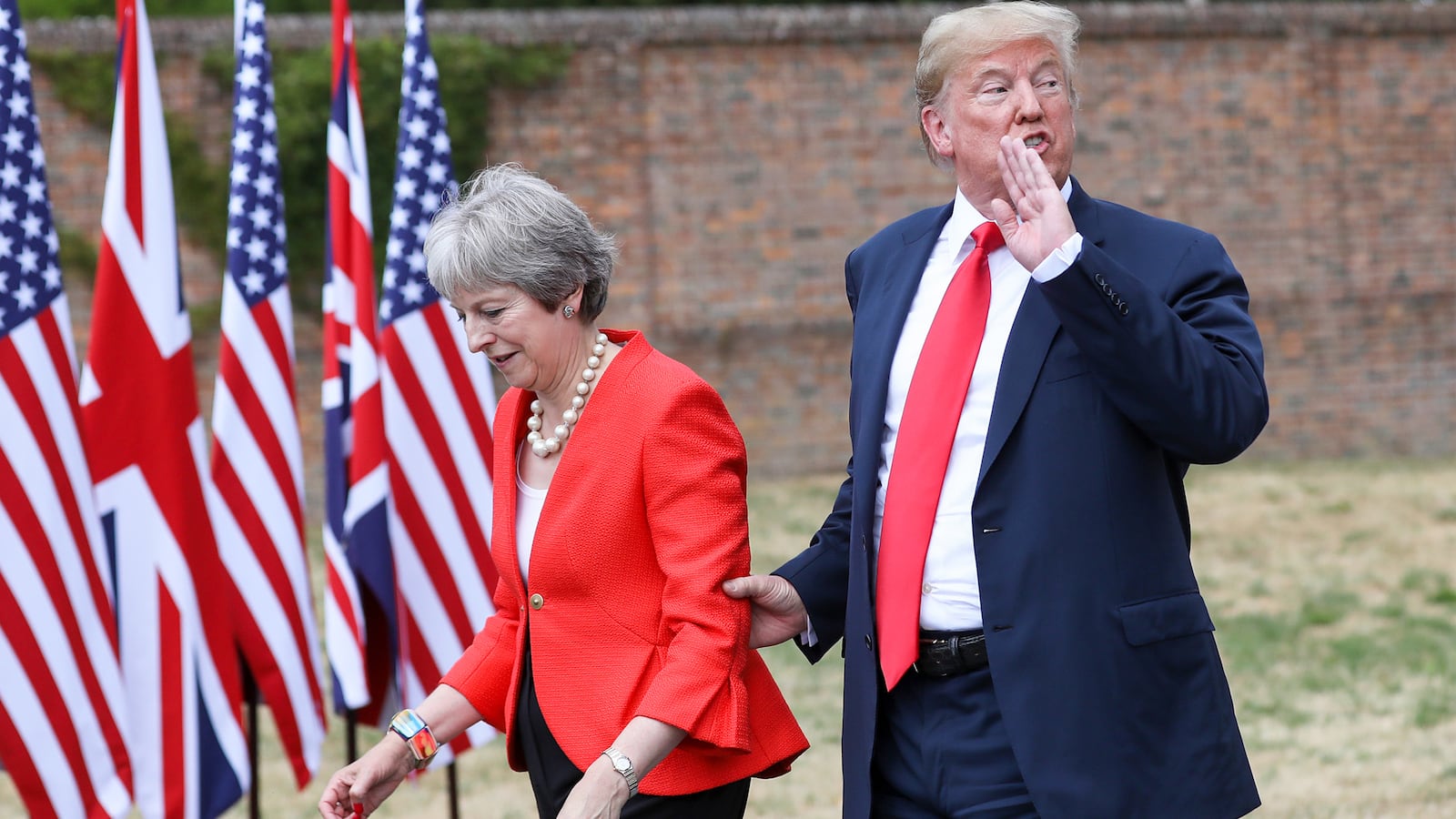LONDON—Like any other bully, President Donald Trump wilted when he was confronted by his victim.
At a joint press conference with British Prime Minister Theresa May on Friday, Trump tried to distance himself from a bombshell interview that had been published just hours earlier. In it, he had belittled and undermined his host. Now, he tried to spin the long interview with The Sun newspaper as “fake news,” saying the White House would release a recording to show how generous he had been to May in reality.
Unfortunately for Trump, the newspaper had already released audio clips of his damning verdict on May’s work as prime minister.
As news of his disastrous foray into international diplomacy raced around the world and tens of thousands of protesters gathered in London, Trump appeared in the garden of the PM’s country residence with a statement—carefully worded by someone else—laid out on his lectern.
He read slowly and deliberately; May turned to face him, looking down at the script he was now delivering with a straight face: “The enduring relationship between our two countries has never been stronger.”
That was just the start, as Trump lavished praise on May for the first time. “She’s a terrific woman. I think she’s doing a terrific job,” he said.
He apologized for the interview that has disrupted this four-day tour of the U.K. but blamed the tabloid for twisting his words. “It's called fake news, and we solve a lot of problems with the good old recording instrument,” he said. “I also said that this incredible woman right here is doing a fantastic job, a great job.”
He said he had gotten to know May much better over the last two days. “She’s a tough negotiator, she’s a very, very smart and determined person,” he said. “I can tell you there are a lot of people that are looking up now that are saying ‘Gee whiz, she left a lot of people in her wake.’
“She’s a very smart, very tough, very capable person and I would much rather have her as my friend than my enemy, that I can tell you.”
Since May became prime minister in the summer of 2016, her sole focus has been negotiating Britain’s exit from the European Union. On Monday, foreign secretary Boris Johnson resigned from her government in protest over her handling of the negotiations.
Trump failed to backtrack on his praise for Johnson—repeating his assertion that May’s political nemesis would make a great prime minister, this time while standing at her side.
He did change his position on the terms of that deal, however. No longer did he think May’s European trading compromise meant a bilateral U.S. free trade agreement was dead in the water. “I don’t know what they're going to do but whatever you do is OK with me—that’s your decision,” he said.
Trump has long been a cheerleader for Brexit, and he has repeatedly claimed on this European tour that British voters chose to leave the EU because of a desire to reduce immigration.
On the eve of Trump’s arrival in London, his old campaign manager and adviser Steve Bannon was in town hosting an event for European populists such as Nigel Farage, the most prominent anti-immigration Brexit campaigner, and Louis Aliot, a hard-right French politician and boyfriend of French right-winger Marine Le Pen.
Since leaving the White House, Bannon has deepened his ties with the European far-right, including Italy’s xenophobic interior minister, Matteo Salvini, and hardline Hungarian Prime Minister Victor Orban.
Trump seems to have embraced similar influences. Gone are his attacks on illegal immigration: In Europe he has joined the shrill populist claims that any kind of immigration is damaging the cultural fabric of Europe.
“I know it’s politically, not necessarily correct, to say that, but I’ll say it and I’ll say it loud,” he said during the press conference with May. “I think it has been very bad for Europe. I think that what has happened is very tough. It’s a very tough situation. I mean, you see the same terror attacks that I do. We see them a lot. I just think it's changing the culture. It’s a very negative thing for Europe.”
On Germany, where Angela Merkel responded to the migrant crisis following the Syrian civil war by allowing more than a million refugees into the country, Trump said: “I think they had better watch themselves because you are changing culture, you are changing a lot of things, you’re changing security.”
Farage deployed similar rhetoric to help win the Brexit referendum, and he has been hinting to reporters that his influence on Trump has helped to inform the president’s apparent desire for Britain to cut itself off from Europe decisively.
Trump went out of his way to make peace with May on Friday, but his natural sympathies clearly lie with Farage and his old colleagues at the U.K. Independence Party, people who were memorably described by former Prime Minister David Cameron as “fruitcakes and loonies and closet racists.”






